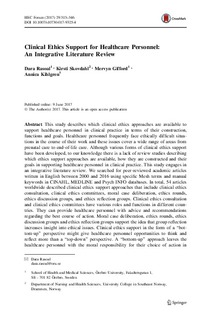| dc.contributor.author | Rasoal, Dara | |
| dc.contributor.author | Skovdahl, Kirsti | |
| dc.contributor.author | Gifford, Mervyn | |
| dc.contributor.author | Kihlgren, Annica | |
| dc.date.accessioned | 2018-02-14T13:21:19Z | |
| dc.date.available | 2018-02-14T13:21:19Z | |
| dc.date.created | 2017-12-27T20:54:22Z | |
| dc.date.issued | 2017 | |
| dc.identifier.citation | HEC Forum. 2017, 29 (4), 313-346. | nb_NO |
| dc.identifier.issn | 0956-2737 | |
| dc.identifier.uri | http://hdl.handle.net/11250/2484721 | |
| dc.description.abstract | This study describes which clinical ethics approaches are available to support healthcare personnel in clinical practice in terms of their construction, functions and goals. Healthcare personnel frequently face ethically difficult situations in the course of their work and these issues cover a wide range of areas from prenatal care to end-of-life care. Although various forms of clinical ethics support have been developed, to our knowledge there is a lack of review studies describing which ethics support approaches are available, how they are constructed and their goals in supporting healthcare personnel in clinical practice. This study engages in an integrative literature review. We searched for peer-reviewed academic articles written in English between 2000 and 2016 using specific Mesh terms and manual keywords in CINAHL, MEDLINE and Psych INFO databases. In total, 54 articles worldwide described clinical ethics support approaches that include clinical ethics consultation, clinical ethics committees, moral case deliberation, ethics rounds, ethics discussion groups, and ethics reflection groups. Clinical ethics consultation and clinical ethics committees have various roles and functions in different countries. They can provide healthcare personnel with advice and recommendations
regarding the best course of action. Moral case deliberation, ethics rounds, ethics discussion groups and ethics reflection groups support the idea that group reflection increases insight into ethical issues. Clinical ethics support in the form of a ‘‘bottom-up’’ perspective might give healthcare personnel opportunities to think and reflect more than a ‘‘top-down’’ perspective. A ‘‘bottom-up’’ approach leaves the healthcare personnel with the moral responsibility for their choice of action in clinical practice, while a ‘‘top-down’’ approach risks removing such moral responsibility. | nb_NO |
| dc.language.iso | eng | nb_NO |
| dc.rights | Navngivelse 4.0 Internasjonal | * |
| dc.rights.uri | http://creativecommons.org/licenses/by/4.0/deed.no | * |
| dc.title | Clinical Ethics Support for Healthcare Personnel: An Integrative Literature Review | nb_NO |
| dc.type | Journal article | nb_NO |
| dc.type | Peer reviewed | nb_NO |
| dc.description.version | publishedVersion | nb_NO |
| dc.rights.holder | The Author(s) 2017 | nb_NO |
| dc.source.pagenumber | 313-346 | nb_NO |
| dc.source.volume | 29 | nb_NO |
| dc.source.journal | HEC Forum | nb_NO |
| dc.source.issue | 4 | nb_NO |
| dc.identifier.doi | 10.1007/s10730-017-9325-4 | |
| dc.identifier.cristin | 1532257 | |
| cristin.unitcode | 222,56,1,0 | |
| cristin.unitname | Institutt for sykepleie- og helsevitenskap | |
| cristin.ispublished | true | |
| cristin.fulltext | original | |
| cristin.qualitycode | 1 | |

